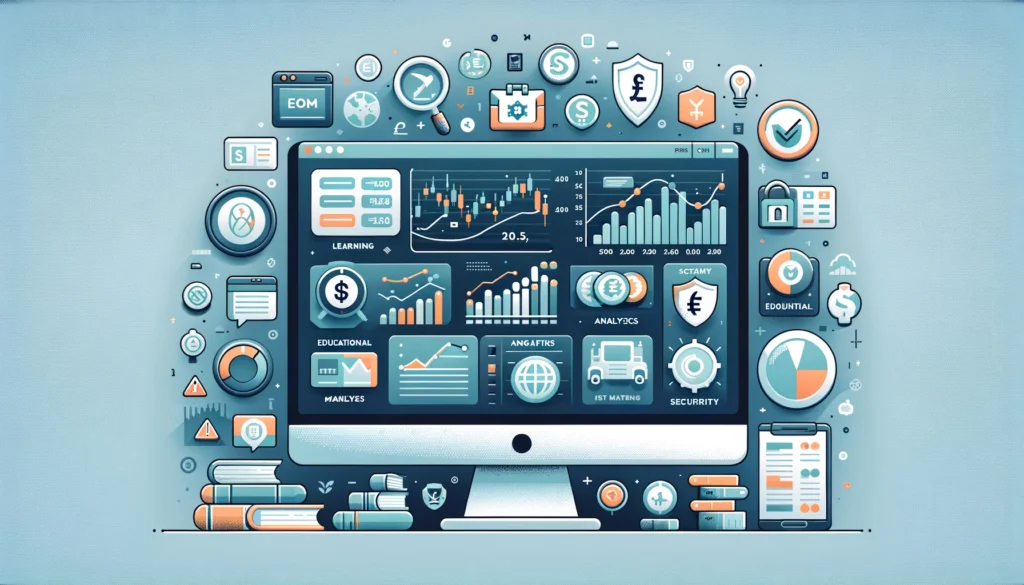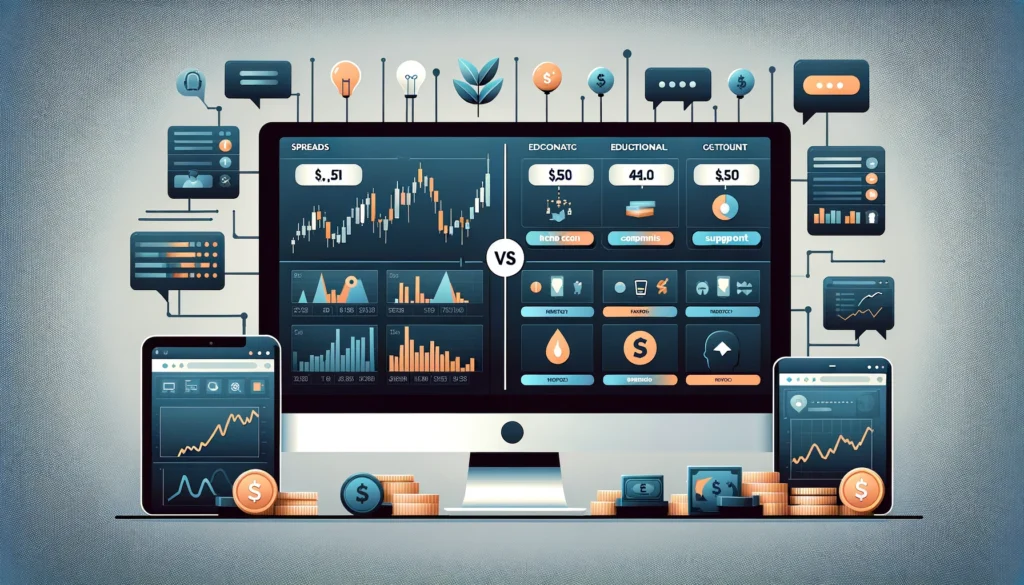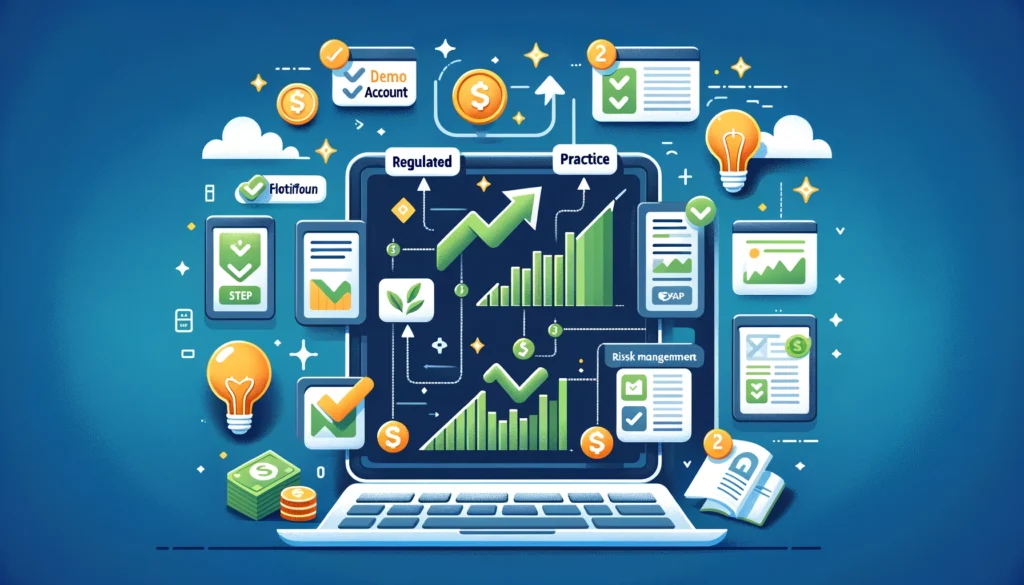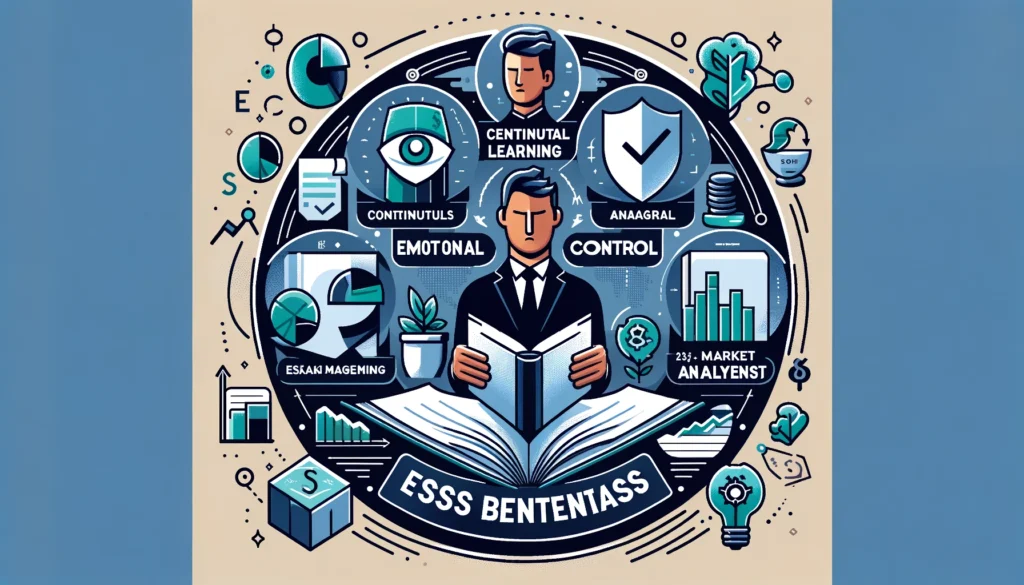Table of Contents
Introduction to Forex Trading: Understanding the Basics
Forex trading, a term that stands for foreign exchange trading, involves the simultaneous buying and selling of world currencies. This financial endeavor, known for its high liquidity and 24/5 operational hours, allows traders to capitalize on the fluctuation of global currencies. While forex trading holds the promise of financial gain, it also comes with its share of risks, particularly due to market volatility.
The allure of forex trading for beginners lies in its accessibility. Unlike stock markets, which may require substantial initial investments, forex trading can be started with a relatively low amount of capital. Additionally, with the advent of online trading platforms, it has become easier for individuals around the globe to participate in the forex market from the comfort of their homes or local cafes.
However, stepping into the forex trading arena without proper knowledge can be akin to navigating a ship without a compass. The market’s complexity, coupled with its volatile nature, necessitates a solid understanding of trading principles and strategies. This is where the significance of choosing the right forex trading platform comes into play.
A beginner-friendly trading platform can serve as a gateway to the world of forex, providing essential tools, resources, and support to help new traders understand market dynamics and make informed decisions. From user-friendly interfaces to educational materials and demo accounts, the right platform can dramatically enhance the trading experience for novices, setting them on a path to potential success in the forex market.
In this blog post, we will explore the key features that beginners should look for in a forex trading platform, review some of the top platforms suitable for newcomers, and provide guidance on how to get started with forex trading. Whether you’re contemplating your first foray into forex or seeking to understand the basics before diving in, this guide aims to equip you with the knowledge and confidence needed to navigate the forex landscape.

Features to Look for in a Forex Trading Platform
Selecting the right forex trading platform is crucial for beginners. It can be the difference between a rewarding learning experience and a frustrating one. Here are the essential features newcomers should look for:
- User-Friendly Interface: For someone new to forex, the trading platform should be intuitive and easy to navigate. A cluttered or complex interface can be overwhelming. Beginners should opt for platforms that offer a clear layout, easily accessible information, and a straightforward process for executing trades.
- Educational Resources: Learning is a continuous journey in forex trading. The best platforms for beginners provide a wealth of educational materials, such as tutorials, articles, videos, and webinars. These resources should cover the basics of forex trading, market analysis techniques, and strategies for risk management. A platform that prioritizes your education is a platform investing in your success.
- Demo Accounts: One of the most valuable features for beginners is a demo account. This allows you to practice trading in a risk-free environment, using virtual money. It’s an excellent way for novices to gain practical experience without the stress of real financial loss. Look for platforms that offer unlimited access to demo accounts.
- Risk Management Tools: Forex trading comes with its set of risks. Therefore, a platform equipped with risk management tools, such as stop-loss orders, is essential. These tools help manage and minimize potential losses, providing beginners with a safety net as they navigate through their initial trades.
- Customer Support: Good customer support can be incredibly beneficial, especially for those new to forex trading. Look for platforms that offer multiple channels of support (such as live chat, email, and phone) and provide prompt, helpful service. The availability of support in your local language is an added bonus.
- Regulatory Compliance: Ensure that the trading platform is regulated by a reputable authority. Regulatory compliance adds a level of security to your trading and ensures that the platform adheres to strict financial standards and practices.
- Market Research and Analysis Tools: Access to real-time market data, analysis tools, and expert commentary can help you make informed trading decisions. While beginners may not initially understand all the analytics, having these tools at your disposal is crucial as you advance.
By prioritizing these features, beginners can find a forex trading platform that not only helps them to learn and grow but also provides a secure and supportive environment for their trading journey.

Top Forex Trading Platforms for Beginners
When embarking on the journey of forex trading, choosing the right platform is a critical decision. Here, we’ll review some of the top forex trading platforms suitable for beginners, highlighting their features, advantages, and what makes them stand out.
- OANDA:
- User Experience: Known for its user-friendly interface, OANDA caters to beginners with straightforward navigation and a customizable dashboard.
- Educational Resources: Provides a comprehensive range of learning tools, including webinars, tutorials, and articles.
- Demo Account: Offers a no-time-limit demo account, allowing beginners to practice strategies without risk.
- Regulation: Heavily regulated by top-tier authorities, ensuring a high level of security and fairness.
- FOREX.com:
- User Experience: Features a robust and well-designed platform, making navigation and trading straightforward for new users.
- Educational Resources: Offers extensive educational materials, suited for both beginners and experienced traders.
- Demo Account: Provides a demo account to help new traders familiarize themselves with forex trading.
- Tools and Analysis: Offers sophisticated charting tools and real-time market analysis to inform trading decisions.
- IG Group:
- User Experience: Boasts a customizable interface and access to over 17,000 markets, offering a vast learning environment for newcomers.
- Educational Resources: Provides a wealth of learning materials, including IG Academy, which is specifically designed for new traders.
- Demo Account: Allows beginners to start with a demo account, offering a safe space to learn and experiment.
- Customer Support: Outstanding customer service with 24/7 access, ensuring help is available whenever needed.
Each of these platforms provides unique features tailored to beginners, from educational resources to demo accounts and intuitive interfaces. When selecting a platform, consider what aspects are most important to your learning style and trading goals. Whether it’s the comprehensive educational content of FOREX.com, the user-friendly design of OANDA, or the extensive market access provided by IG Group, there’s a platform suited to every beginner trader’s needs.
It’s also important to consider the regulatory framework each platform adheres to, ensuring your investments are secure and managed professionally. Remember, the best platform is one that not only helps you learn Forex trading but also aligns with your specific trading style and needs.

Getting Started with Forex Trading for Beginners
Embarking on the journey of forex trading can be both exciting and daunting for beginners. However, by following structured steps, new traders can navigate this new world with confidence. Here’s a beginner’s roadmap to starting forex trading:
- Educate Yourself: Before diving into trading, it’s crucial to understand the basics of the forex market. Spend time learning about how the market works, currency pairs, and the factors that influence currency movements.
- Choose a Regulated Broker: Select a forex trading platform that is reliable and regulated by reputable authorities. This ensures the safety of your funds and a fair trading environment.
- Set Up a Demo Account: Practicing with a demo account is invaluable. It allows you to get a feel for the market and practice trading strategies without risking real money.
- Develop a Trading Plan: A solid trading plan should include your profit goals, risk tolerance level, evaluation criteria, and trading strategies. A well-thought-out plan will help you stay focused and avoid emotional trading.
- Start with Small Investments: When you’re ready to start live trading, begin with small amounts. This will help you understand the market better without exposing yourself to significant risks.
- Apply Risk Management: Learn and apply risk management techniques. Use stop-loss orders to limit potential losses and take-profit orders to secure profits.
- Analyze and Review: Regularly analyze your trades and review what worked and what didn’t. This will help you refine your strategies and improve your trading performance over time.
- Stay Informed: The forex market can be influenced by various global events. Stay informed about world events, economic announcements, and market trends.
- Maintain Emotional Control: Forex trading can be emotional. It’s important to stay calm, keep greed and fear in check, and stick to your trading plan.
- Continue Learning: The forex market is dynamic, and continuous learning is key to long-term success. Keep updating your knowledge and strategies to stay ahead in the game.
By following these steps, beginners can systematically approach forex trading and gradually develop the skills and confidence needed to trade effectively. Remember, forex trading is not a sprint but a marathon. Patience, persistence, and continuous learning are key to achieving success in the forex market.

Essential Tips for Success in Forex Trading
Embarking on the forex trading journey requires more than just knowledge of the market; it requires discipline, patience, and a solid approach to risk management. Here are essential tips every beginner should embrace to pave the way for successful trading:
- Continuous Learning: The forex market is ever-evolving, with new patterns, trends, and events affecting currency values daily. Commit to lifelong learning by staying updated with the latest market news, trends, and trading techniques.
- Emotional Control: Emotional trading often leads to rash decisions and mistakes. Cultivate emotional discipline by sticking to your trading plan and not letting fear or greed dictate your actions.
- Risk Management: Protect your capital by using risk management strategies such as stop-loss orders, and never risk more than you can afford to lose. Understand that losing trades is part of the trading process, and focus on maintaining a positive risk-to-reward ratio.
- Market Analysis: Successful trading involves analyzing the market from multiple perspectives. Combine technical analysis, which involves reading charts and patterns, with fundamental analysis, which involves economic indicators and events, to make informed decisions.
- Realistic Goals: Set achievable goals and realistic expectations. Forex trading is not a quick path to wealth; it’s a skill that requires time to develop. Celebrate small victories and learn from losses.
- Trading Plan: Develop a comprehensive trading plan that outlines your strategy, risk tolerance, and evaluation criteria. Stick to your plan and adjust it only when necessary based on a thorough review of your trading performance.
- Use of Demo Accounts: Practice makes perfect. Use demo accounts to hone your skills without financial risk. Experiment with different strategies to find what works best for you.
- Patience and Persistence: Success in forex trading doesn’t come overnight. Be patient and persistent, keep refining your strategies, and don’t get discouraged by setbacks.
- Networking and Community: Engage with other traders, join trading communities, and share experiences and strategies. Learning from others can provide new insights and help improve your trading approach.
- Health and Stress Management: Maintain a healthy balance between trading and life. Ensure you get enough rest, exercise regularly, and manage stress, as a clear mind leads to better trading decisions.
By integrating these tips into your trading routine, you can develop the discipline, knowledge, and mindset necessary for success in the forex market. Remember, successful trading is not about making large profits quickly, but consistently making smart, well-informed decisions over time.
FAQs on Forex Trading for Beginners
Can I start trading forex with a small amount of money?
Yes, you can start trading forex with a small amount of money. Many forex brokers offer micro or mini accounts that allow you to trade smaller amounts compared to standard lots. However, remember that trading with smaller amounts will also yield smaller profits or losses.
How do forex markets work?
The forex market is a global decentralized market where currencies are traded. It operates 24 hours a day, five days a week, and involves buying one currency while selling another. Prices fluctuate based on supply and demand dynamics, economic factors, geopolitical events, and market sentiment.
What are currency pairs?
In forex trading, currencies are traded in pairs, such as EUR/USD (Euro/US Dollar). The first currency listed (EUR) is the base currency, and the second (USD) is the quote currency. The price represents how much of the quote currency is needed to purchase one unit of the base currency.
What is a pip?
A pip is the smallest price move in a currency pair in the forex market. It typically represents a one-digit movement in the fourth decimal place of a currency pair, such as 0.0001. For example, if EUR/USD moves from 1.1050 to 1.1051, it has moved one pip.
What are leverage and margin in forex trading?
Leverage allows traders to control larger positions with a smaller amount of actual capital. Margin is the amount of money required to open and maintain a leveraged position. While leverage can amplify profits, it can also amplify losses, so it’s important to use it cautiously.
How do I choose a forex broker?
When choosing a forex broker, consider factors such as regulation, platform features, spreads and commissions, leverage options, customer service, and educational resources. It’s crucial to select a broker that is regulated by a reputable authority to ensure the safety and security of your funds.
What is a stop-loss order?
A stop-loss order is a risk management tool that automatically closes a trading position at a predetermined price to limit potential losses. It’s an essential feature for managing risk, especially for beginners.
Can I practice forex trading before going live?
Yes, most forex brokers offer demo accounts where you can practice trading with virtual money in a risk-free environment. This is a great way to gain experience and test strategies without risking real money.
How do I know when to buy or sell a currency pair?
Decisions to buy or sell should be based on your market analysis, which can include technical analysis (studying charts and patterns) and fundamental analysis (considering economic indicators and events). It’s also important to consider your trading strategy and risk tolerance.
How can I stay updated with forex market news?
Stay updated by following financial news websites, using forex analysis tools, subscribing to newsletters, and joining forex trading communities. Staying informed will help you make better trading decisions based on current market conditions.





